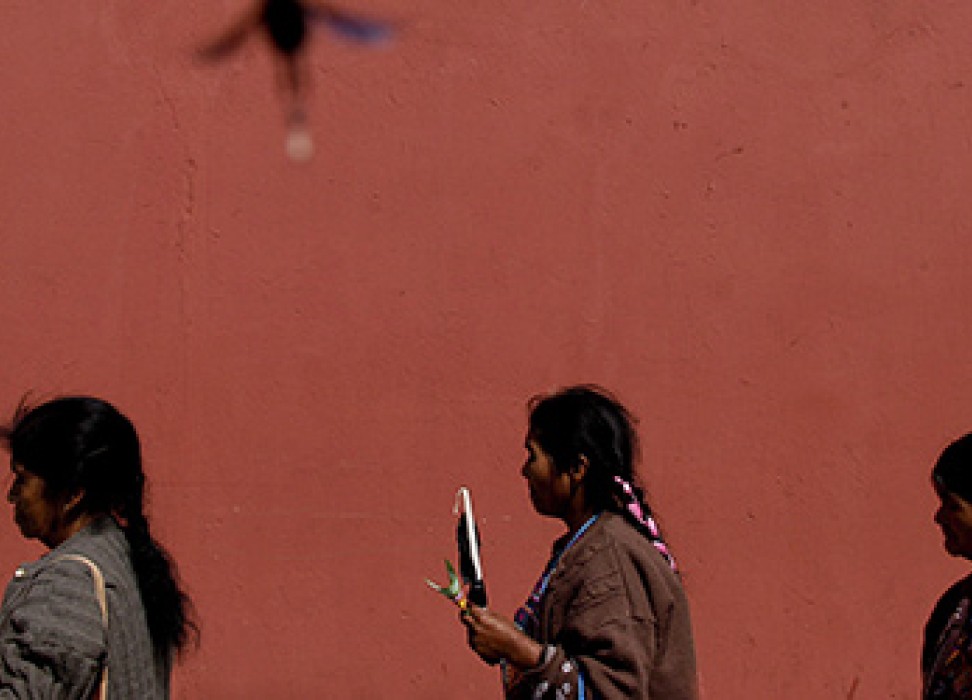Putting women’s rights at the forefront of judicial decisions
03 August 2016

Access to justice is a key pillar towards the eradication of violence against women and girls. It contributes to break the circle of violence, provide adequate reparation to victims, and transform the circumstances that make women and girls vulnerable to violence.
Enhancing the efforts of judges in protecting the rights of women and girls is essential in this process. That is the purpose of a toolkit developed by OHCHR Guatemala, which seeks to promote a human rights approach and the inclusion of a gender perspective in the administration of justice in cases of femicide and other forms of violence against women.
“The toolkit provides guidance to judges and magistrates when analyzing cases of violence against women, femicide, exploitation and trafficking in persons”, said Alberto Brunori, Representative of OHCHR in Guatemala. “It compiles good practices identified in rulings issued by national courts as well as international human rights standards. The objective is to put the victim and her rights at the forefront of every judicial decision”, he added.
The toolkit is the result of a close collaboration between OHCHR Guatemala, the Supreme Court of Justice, the School of Judicial Studies and the Specialized Justice Follow-up and Evaluation Unit of the judiciary, with the support of the OHCHR Gender Unit in Geneva.
“The toolkit will be used as a guide in the interpretation of international treaties, in accordance with national legislation”, said magistrate Ranulfo Rafael Rojas, President of the Supreme Court of Justice. “We consider judges will find it very useful in order to issue rulings and decisions with a gender perspective” he added.
A previous study conducted by OHCHR concluded that specialized tribunals on femicide and other forms of violence against women have substantially reduced impunity in the country. However, as specialized courts are currently present only in 11 of 22 departments of Guatemala, judicial authorities and OHCHR also identified the utmost importance of enhancing the capacities of judges from ordinary tribunals. Training them on how to better apply a gender and human rights perspective in cases of femicide and other forms of violence against women would definitely contribute to the overall national effort in reducing impunity in such cases.
“This toolkit (…) is a key contribution, as research shows that gender stereotypes and gender-blindness can greatly influence the way in which the credibility of victims is assessed and crimes of violence against women understood, often resulting in impunity”, said Veronica Birga, Chief of OHCHR Women's Human Rights and Gender Section.
“This toolkit will help us to identify the appropriate international standards in a concrete case, and what is more important, how to use them to recognize the rights at stake and take adequate measures”, said judge Leticia Alvizuris, of the tribunal of femicide and other forms of violence against women in Guatemala.
With the support of OHCHR, the School of Judicial Studies organized four initial workshops for ordinary and specialized criminal judges in Guatemala City, Quetzaltenango, Zacapa and Chiquimula to explain the use of the toolkit.
Authorities of the School expressed their commitment to integrate the toolkit in the programs of initial and continuous training for judges. “The School of Judicial Studies has a very important role (…) to play in promoting that rulings with gender perspective be issued throughout the country”, said Dora Lisseth Nájera, the School´s coordinator.
The number of judicial decisions in cases of femicide and violence against women has increased in the last years, mainly due to the work of specialized tribunals. According to the Judiciary, in 2015 these courts issued 4,149 verdicts, compared to 3,628 in the previous year. To strengthen these positive results, the High Commissioner has recommended that Guatemala should adopt institutional policies to assure specialized trainings for judges on violence against women, as well as to expand the coverage of specialized tribunals, providing them with sufficient resources to work efficiently.
3 August 2016

